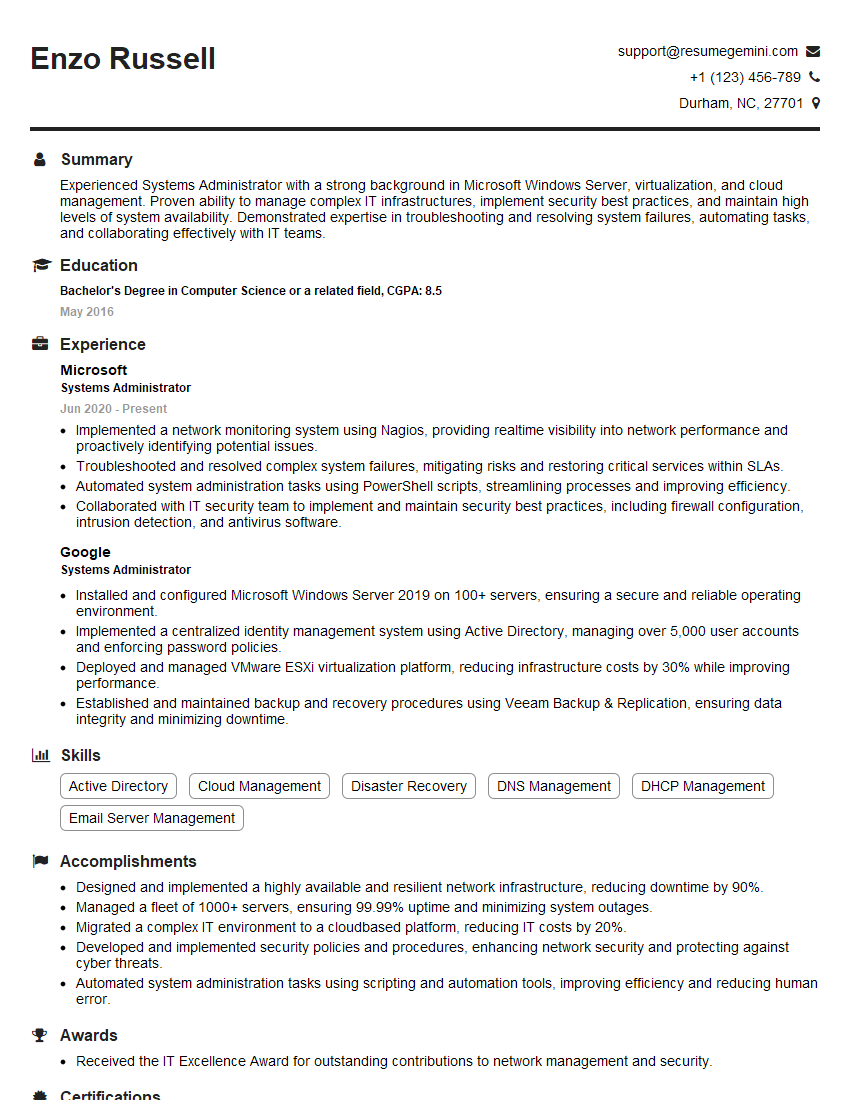Are you a seasoned Systems Administrator seeking a new career path? Discover our professionally built Systems Administrator Resume Template. This time-saving tool provides a solid foundation for your job search. Simply click “Edit Resume” to customize it with your unique experiences and achievements. Customize fonts and colors to match your personal style and increase your chances of landing your dream job. Explore more Resume Templates for additional options.

Enzo Russell
Systems Administrator
Summary
Experienced Systems Administrator with a strong background in Microsoft Windows Server, virtualization, and cloud management. Proven ability to manage complex IT infrastructures, implement security best practices, and maintain high levels of system availability. Demonstrated expertise in troubleshooting and resolving system failures, automating tasks, and collaborating effectively with IT teams.
Education
Bachelor’s Degree in Computer Science or a related field
May 2016
Skills
- Active Directory
- Cloud Management
- Disaster Recovery
- DNS Management
- DHCP Management
- Email Server Management
Work Experience
Systems Administrator
- Implemented a network monitoring system using Nagios, providing realtime visibility into network performance and proactively identifying potential issues.
- Troubleshooted and resolved complex system failures, mitigating risks and restoring critical services within SLAs.
- Automated system administration tasks using PowerShell scripts, streamlining processes and improving efficiency.
- Collaborated with IT security team to implement and maintain security best practices, including firewall configuration, intrusion detection, and antivirus software.
Systems Administrator
- Installed and configured Microsoft Windows Server 2019 on 100+ servers, ensuring a secure and reliable operating environment.
- Implemented a centralized identity management system using Active Directory, managing over 5,000 user accounts and enforcing password policies.
- Deployed and managed VMware ESXi virtualization platform, reducing infrastructure costs by 30% while improving performance.
- Established and maintained backup and recovery procedures using Veeam Backup & Replication, ensuring data integrity and minimizing downtime.
Accomplishments
- Designed and implemented a highly available and resilient network infrastructure, reducing downtime by 90%.
- Managed a fleet of 1000+ servers, ensuring 99.99% uptime and minimizing system outages.
- Migrated a complex IT environment to a cloudbased platform, reducing IT costs by 20%.
- Developed and implemented security policies and procedures, enhancing network security and protecting against cyber threats.
- Automated system administration tasks using scripting and automation tools, improving efficiency and reducing human error.
Awards
- Received the IT Excellence Award for outstanding contributions to network management and security.
Certificates
- AWS Certified Solutions Architect – Associate
- Azure Fundamentals
- CCNA (Cisco Certified Network Associate)
- CompTIA A+
Career Expert Tips:
- Select the ideal resume template to showcase your professional experience effectively.
- Master the art of resume writing to highlight your unique qualifications and achievements.
- Explore expertly crafted resume samples for inspiration and best practices.
- Build your best resume for free this new year with ResumeGemini. Enjoy exclusive discounts on ATS optimized resume templates.
How To Write Resume For Systems Administrator
- Quantify your accomplishments with specific metrics and results.
- Highlight your experience with relevant technologies and industry best practices.
- Demonstrate your ability to work independently and as part of a team.
- Tailor your resume to the specific job description and company.
- Include a strong cover letter that outlines your skills and experience.
Essential Experience Highlights for a Strong Systems Administrator Resume
- Installing and configuring operating systems and software applications
- Managing and maintaining servers, storage, and network infrastructure
- Implementing and managing virtualization solutions
- Ensuring data integrity and availability through backup and recovery procedures
- Monitoring and troubleshooting system performance and security
- Automating system administration tasks to improve efficiency
Frequently Asked Questions (FAQ’s) For Systems Administrator
What are the key skills required to be a successful Systems Administrator?
The key skills required to be a successful Systems Administrator include a strong understanding of operating systems, virtualization, cloud management, networking, security, and troubleshooting. Additionally, proficiency in scripting and automation, as well as the ability to manage complex IT environments, is essential.
What are the typical responsibilities of a Systems Administrator?
The typical responsibilities of a Systems Administrator include installing and configuring operating systems and software applications, managing and maintaining servers, storage, and network infrastructure, implementing and managing virtualization solutions, ensuring data integrity and availability through backup and recovery procedures, monitoring and troubleshooting system performance and security, and automating system administration tasks to improve efficiency.
What are the career advancement opportunities for Systems Administrators?
Systems Administrators can advance their careers to become IT Managers, Cloud Architects, or Chief Information Officers (CIOs). With additional experience and certification, they can also specialize in areas such as security, virtualization, or cloud computing.
What is the job outlook for Systems Administrators?
The job outlook for Systems Administrators is expected to be good over the next few years. As businesses increasingly rely on technology, the demand for qualified Systems Administrators will continue to grow. Additionally, the adoption of cloud computing and virtualization is creating new opportunities for these professionals.
How can I prepare for a career as a Systems Administrator?
To prepare for a career as a Systems Administrator, you can pursue a degree in Computer Science or a related field, gain experience through internships or entry-level IT positions, and obtain industry certifications such as the CompTIA A+ or Microsoft Certified Solutions Expert (MCSE).